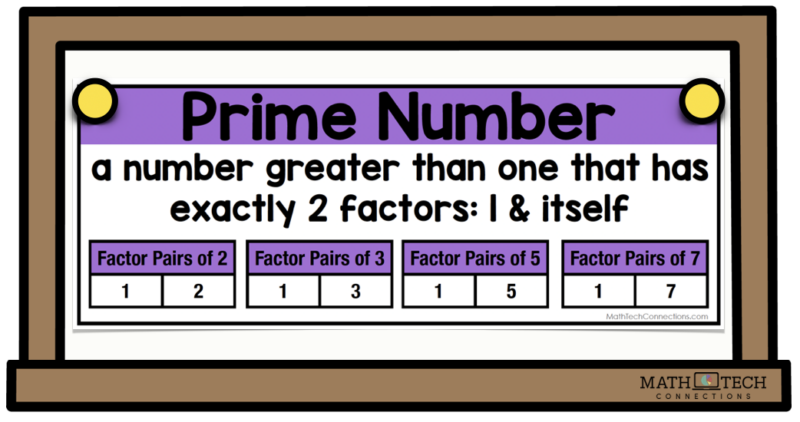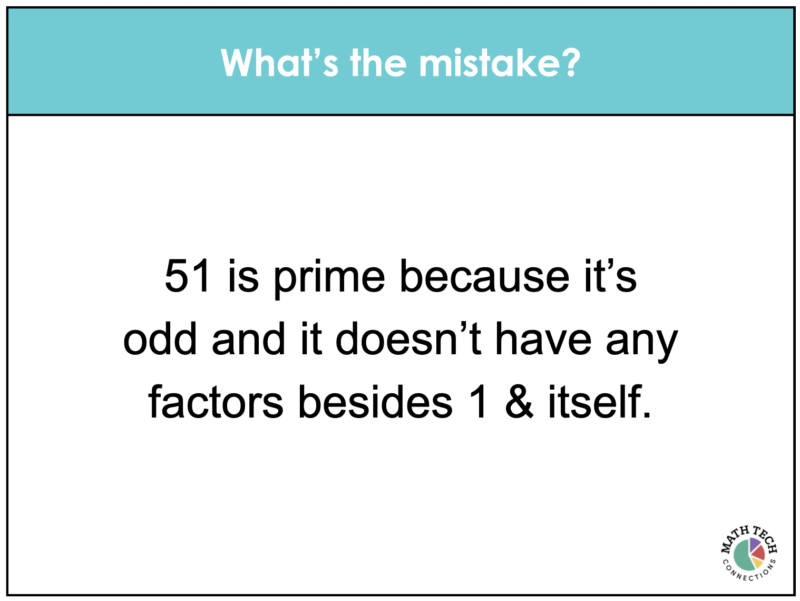
Prime numbers have exactly 2 factors – just 1 and itself.
Some of the smallest prime numbers are 1-digit numbers.

- 3 is a prime number.

- 5 is a prime number.

- 7 is a prime number.
3, 5, & 7 are prime because they cannot be divided evenly into equal groups.
let’s go over a few special cases of prime numbers.
- 0 is not prime or composite.
- When 0 is used as a place holder in the ones place, though, it makes a number even so it is automatically composite.
- 1 is not prime or composite either.
- The definition of prime says a number has “exactly 2 factors.” 1 only has 1 factor – itself!
- 2 is a prime number.
- It is the only even prime number, because it only has 2 factors – 1 & itself.
All prime numbers (except for 2!) are odd.
But, not all odd numbers are prime.
How to identify if a number is prime
- Test if it is divisible by any other numbers.
- Find its factors.
The first 9 prime numbers are highlighted below. Each number is only divisible by 1 & itself.

2 is prime. It is only divisible by 1 & itself.
- 2 ÷ 2 = 1
- 2 ÷ 1 = 2
Factors of 2: 2 & 1
3 is prime. It is only divisible by 1 & itself.
- 3 ÷ 3 = 1
- 3 ÷ 1 = 3
Factors of 3: 3 & 1
5 is prime. It is only divisible by 1 & itself.
- 5 ÷ 5 = 1
- 5 ÷ 1 = 5
Factors of 5: 5 & 1
Divisibility Rules
Every number that meets any of the divisibility rules from 2 down (except for 2) is composite.
| Divisible by? | Rule |
|---|---|
| 1 | Every number is divisible by 1 and itself. |
| 2 | Every even number (with 0, 2, 4, 6, or 8 ones) is divisible by 2. |
| 3 | The sum of the number’s digits will be divisible by 3: 3, 6, 9, etc. |
| 4 | Use strategies to check for divisibility by 4. Every other even number from 4 is divisible by 4. |
| 5 | Numbers that end in 5 or 0 are divisible by 5. |
| 6 | Numbers are divisible by 6 if they are divisible by 2 AND 3. |
| 7 | Use strategies to check for divisibility by 7. |
| 8 | Use strategies to check for divisibility by 8. |
| 9 | The sum of the number’s digits will be divisible by 9. |
| 10 | Numbers with 0 ones are divisible by 10. |
Is 9 prime?
Can 9 be divided into equal groups?
Yes, 9 ÷ 3 = 3
The factors of 9 are 1, 3, & 9.
9 is a multiple of 3 x 3, so 9 is a composite number.
Is 24 prime?
No.
24 is even & divisible by 2.
24 ÷ 2 = 12
24 is a composite number.
Is 31 prime?
Yes! 31 is prime.
- 31 is odd, so it isn’t divisible by 2.
- 3 + 1 = 4, so it isn’t divisible by 3.
- It’s not divisible by 4 because 4 x 7 = 28 and 4 x 8 = 32.
- It’s not divisible by 5 or 10 because there is only 1 one.
- It’s not divisible by 6 because 6 x 5 = 30 and 6 x 6 = 36.
- It’s not divisible by 7 because 7 x 4 = 28 and 7 x 5 = 35.
- It’s not divisible by 8 because 8 x 3 = 24 and 8 x 4 = 32.
- It’s not divisibly by 9 because 9 x 3 = 27 and 9 x 4 = 36.
Practice Problems
True or False?
The number 21 is odd, so it’s a prime number.
21 is composite.
21 is composite.
21 is a multiple of 3 and 7.
Its factors are 1, 3, 7, & 21.
Select the prime numbers.
Select the prime numbers.
